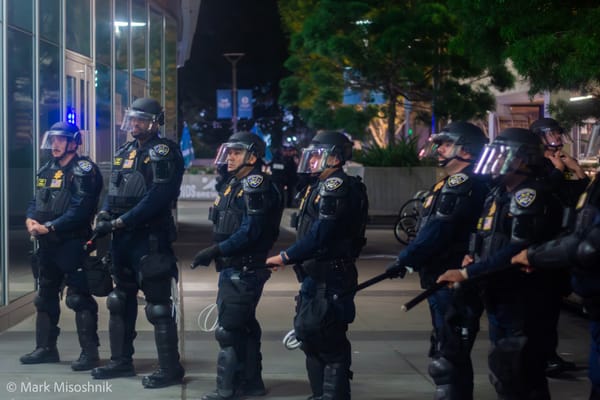For Israel, It's Never Been About the Hostages

“If Hamas releases the hostages, the war ends tomorrow.”
It’s a common refrain among Zionists, but it runs counter to the Israeli government’s own policies and the reality on the ground.
Finance Minister Bezalel Smotrich has said, “It’s not the most important thing,” choosing instead to prioritize the destruction of Hamas, angering the families of hostages still being held in Gaza. These same families, by the way, are calling for a hostage deal and a ceasefire to rescue their family members. These are not American leftists on college campuses; these are moderate Israeli citizens. Other survivors and their families have been assaulted by Israeli police, with the mother of one hostage being punched in the face and others being blasted with a water cannon.
It's not like there isn't precedent for a deal, either. A ceasefire in late November allowed 105 hostages to be released from Gaza. All of the hostages could have been released as early as October 9, but Israel refused to accept the deal. Another deal was rejected in February, inciting protests in Tel Aviv.
It also seems like Zionists don't care much for rescued Israelis unless they are "perfect victims." Agam Goldstein-Almog, a released hostage, was harassed for not being sufficiently injured and giving an honest account of her ordeal, with some people saying they wish she had been raped or killed instead of returning home. Goldstein-Almog's father and brother were murdered by Hamas.

Netanyahu's office has rejected multiple ceasefire deals, saying, "The destruction of Hamas military and governing capabilities ... and ensuring that Gaza no longer poses a threat to Israel" are hard conditions. However, this type of vague platitude only serves to obfuscate the fact that Hamas has agreed to deals wherein they would release all of the hostages, but Israel instead prioritized continuing its destruction of Gaza over the safety of their citizens who are held captive. Netanyahu has expressed as much, using overtly genocidal language.
In fact, the IDF has killed a minimum of 26 hostages themselves. They killed three men who had taken off their white shirts to wave them in order to get help. The IDF claimed they thought it was a "ruse" by Hamas. Another 13 were killed when an Israeli general ordered his soldiers to shell a house in Kibbutz Be'eri and another 10 were killed by further IDF operations.
Hostage families have called out American Jewish organizations, including the Anti-Defamation League and the American Jewish Committee, for their refusal to criticize Netanyahu's government or call for a ceasefire. This lack of action makes their calls of "bring them home now" extremely cynical and hollow.
We are at a critical moment.
— We Are All Hostages (@AllHostages) June 7, 2024
This Saturday evening, no one will stay at home. Everyone will come out to stand with the families of the hostages, to say yes to the hostage deal, and to demand our government end the war to save lives!
Hostage deal & Ceasefire Now. pic.twitter.com/PP6IMFNDoQ
There seems to be a clear delineation between people who legitimately want to rescue hostages, using all of their resources to do so, and people who just want another excuse to cheer on mass slaughter of Palestinians. Weaponizing the suffering of families who are explicitly against further military intervention to justify further military intervention is sickening.
After an IDF operation that saw the release of 4 hostages and the killing of over 200 Palestinians, hostage families were clear:
Today there are people using our families to justify a military solution.
— We Are All Hostages (@AllHostages) June 10, 2024
Do not let them.
Only 7 hostages were saved through military operations. 105 were brought through a hostage release deal.
The only way to bring all of our family members home is to end the war.
It's also very important to point out that Israel has over 3,000 Palestinians in "administrative detention," a euphemism they employ against those who have not even been charged with a crime. This includes approximately 60 children. They are, in essence, hostages, but they are never referred to as such nor are there any widespread protests to stop the detentions. The detainees are subject to brutal abuse and torture that has only increased in the wake of October 7.
If Zionists truly want to save hostages, they should be supporting a ceasefire agreement, a hostage exchange, and an influx of humanitarian aid to Gaza. Anything less is tantamount to abandoning not only the hostages, but also the families who are suffering every day, wondering when their loved ones will come home.




